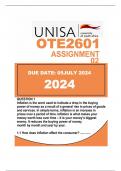, OTE2601
ASSIGNMENT 2
DUE DATE 05 JULY 2024
QUESTION 1
Inflation is the word used to indicate a drop in the buying power of money as a result
of a general rise in prices of goods and services. In simple terms, inflation is an increase in prices over
a period of time. Inflation is what makes your money worth less over time – it is your money’s biggest
enemy. It reduces the buying power of money month by month and year by year.
1.1 How does inflation affect the consumer? Elaborate on the most important
characteristics of inflation [25
The Effects of Inflation on Consumers
Inflation is a complex economic phenomenon that significantly impacts consumers by eroding the
purchasing power of their money. As prices rise over time, consumers need more money to purchase
the same goods and services, leading to a reduction in their purchasing power. This essay will explore
the key characteristics of inflation and how they shape consumer behavior and financial well-being.
Firstly, inflation leads to a reduction in purchasing power, which affects all consumers but has a more
pronounced impact on those with fixed incomes, such as retirees and low-wage workers. For instance, if
the inflation rate is 3% per year, an item that costs R100 today will cost R103 next year. This means that
consumers need more money to purchase the same items they previously bought for less.
Secondly, inflation leads to a higher cost of living as everyday expenses like food, housing,
transportation, and healthcare become more expensive. When the cost of essential goods and services
increases, consumers may need to adjust their spending habits, cutting back on non-essential purchases
or seeking cheaper alternatives. Over time, the increased cost of living can strain household budgets,
particularly for those who do not receive corresponding increases in their income.
Thirdly, inflation erodes the value of savings if the interest rate earned on savings accounts or other
fixed-income investments does not keep pace with inflation. This discourages saving and can lead
consumers to seek higher returns through investments in stocks, real estate, or other assets that
historically outpace inflation. However, these investments come with higher risks, and not all consumers
are willing or able to take on such risks.
Fourthly, inflation introduces uncertainty into the economy, making it difficult for consumers to plan for
the future. When prices are unpredictable, consumers may find it challenging to budget accurately, save
for long-term goals, or make significant financial commitments like buying a home or funding education.
This uncertainty can lead to a cautious approach to spending and investment, potentially slowing
economic growth.
Lastly, inflation can lead to a redistribution of wealth within an economy. Borrowers tend to benefit
during periods of inflation, as they repay their loans with money that is worth less than when they
borrowed it. Conversely, lenders and individuals on fixed incomes are disadvantaged because the value
of the repayments or fixed payments they receive decreases over time. This redistribution effect can




